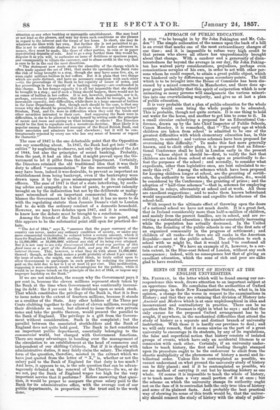APPROACH OF PUBLIC EDUCATION.
A mnr, "to be brought in by Sir John Pakington and Mr. Cobden" ! The simple collocation of the names upon the back of a bill is an event that marks one of the most extraordinary charges of our time ; and. it is impossible to refuse very high credit to that person who above all others has unquestionably brought about that change. With a candour and a generosity of disinterestedness far beyond the average in our day, Sir John Pekington has waived party considerations, prejudices, perhaps even .conscientious scruples of his own in order to act with other persons whom he could respect, to attain a great public object, which was hindered only by differences upon secondary points. The bill which is to be brought into the House of Commons has been discussed by a mixed committee in Manchester, and there does appear great probability that this spirit of cooperation which is now animating so many persons will amalgamate the various minorities into one overwhelming majority, and give us at last a plan of public education. It is very probable that a plan of public education for the whole country would soon bring the whole people to be educated. This is probable, though not quite certain. It is one thing to hold. out water for the horse, and another to get him to come to it. In a small circular embodying a proposal for an Educational Conference' drawn up by the late Chief Inspector of Public Schools, Canon Moseley, it is remarked, that" The early age at which children are taken from school' is admitted to be one of the greatest difficulties with which elementary education has, in this country, to contend' and various schemes have been proposed for overcoming this difficulty." To make this fact more generally known' and to elicit other plans, it is proposed that an Educational Conference shall be held in London early in the present year, "whose object it should be—first, to verify the fact that children are taken from school at such ages as practically to defeat the purposes of the school ; and secondly, to consider what expedients, other than legislative ones, are best calculated to remedy this evil." Among the schemes which have been proposed for keeping children longer at school, are the granting of certificates, the authority to issue which, the qualifications, &c., would be considered by the Conference ; the granting of prizes ; and the adoption of "half-time schemes "—that is, schemes for employing children in relays, alternately at school and at work. All these are excellent suggestions and to make them known beforehand. would unquestionably facilitate and expedite the influence of the school-bell.
With respect to the ultimate effect of throwing open the doors of a national school we have not much doubt. It is a great fact, that in Ireland considerably more than half-a-million of children, and mainly from the poorest families, are in school, and are receiving a substantial education; the number constantly increasing while the population has actually decreased. In the United States, the founding of the public schools is one of the first acts of an organized. community in the progress of settlement ; and. children of all ranks—for there are all ranks in the American Republic—meet at the public school. The objection to such a school with us might be, that it would tend 'to confound all ranks of society." We have an example of it, however, to a certain extent, in the Blue-coat School of London, without any such consequence ; indeed, with no consequence but that of giving an excellent education, which the sons of rich and poor are alike glad to have received.


































 Previous page
Previous page